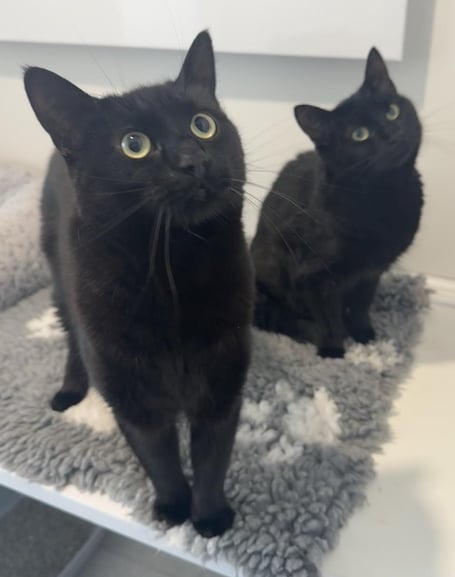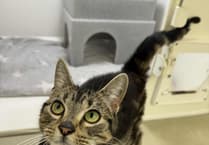Halloween, or Hop Tu Naa, is a festival rooted in ancient mythology, and cats of the black variety are closely linked with it because of their association with the supernatural and witchcraft. In much of the western world black cats are considered to be harbingers of misfortune and wickedness and the black cat still suffers from, as the ‘National Black Cat Day’ website calls it, the ‘consequences of a damaged collective reputation’.
However, an association with witchcraft need not be a sinister one and could be linked to strength, independence and mystery - traits we often see in cats. And in many cultures black cats are associated with good luck – a black cat appearing on your doorstep signals prosperity (a common belief in Scotland), and a black cat crossing your path signals good fortune (in England and Ireland) and giving a Welsh bride a black cat on her wedding day was thought to bring her good luck. And the French call black cats ‘money cats’ (‘chats d’argent’) in the belief that if you show a black cat respect you will be rewarded with riches.
Black cats themselves could do with some good luck. They are two thirds less likely to be adopted than white cats, and fifty percent less likely to be adopted than tabbies. They are also more likely to be involved in a road traffic accident because they are less visible to drivers, particularly at this time of year when people drive to and from work in the dark.
Conversely, a black cat is likely to be healthier than its counterparts. Research has shown that the genetic mutations that cause cats to have black coats may offer them some protection from diseases such as cancer and the feline equivalent of Alzheimer’s.
We have several black cats in our cattery at the moment, including a father and son pair called Onyx (who is three) and Reggie (two). Their elderly owner sadly died, and they have been used to living in a quiet household with no other pets. They are both very affectionate and they love their food!
31st October can be an evening full of disturbance for some households, as Halloween gets into full swing and ‘trick or treaters’ do the rounds. If you have a dog that you think may be unduly upset by frequent rings on the door bell, then why not head up to Archallagan Plantation and join in ‘Walk Tu Naa’ for a dog friendly adventure between 2pm and 7pm ... Deja Brew will be in car park one providing hot drinks for humans and tasty treats for their canine companions.
And next week is also one that may disturb pets and livestock as various firework displays take place across the Island. Please see our Facebook page for more information regarding dates and times, and if you’re planning a private display please let us know, so that we can add it to the list, and ensure your immediate neighbours are made aware.
The RSPCA estimates that 45 percent of dogs in the UK show signs of fear when they hear fireworks. Most dogs have acute hearing which exacerbates the problem. You can help your dog, and any other pets you have in your house, by drawing all the curtains, and providing extra bedding so that your pet can hide under it if necessary. And as a distraction have a TV or radio on with the volume turned up, or play calming music.
Ensure your pet is confined indoors well in advance of the festivities and ensure all doors, windows and cat flaps are closed. Ideally your dog should have had an extra-long walk that day so that he/she is more tired than usual.
And don’t forget the pets you may have outside, such as rabbits and guinea pigs. As well as providing extra bedding, partially cover their hutch or pen with a blanket but make sure your pet can still look out. Or, better still, bring the hutch indoors.
Horses and livestock are also at risk, and there are distressing reports every year of scared animals running into fences in an attempt to escape from, what they perceive as, a threat to their lives. If possible, try to stay with your animals if you know that a firework display is planned nearby, so that you can reassure them with your presence.


.jpeg?width=209&height=140&crop=209:145,smart&quality=75)

.jpeg?width=209&height=140&crop=209:145,smart&quality=75)